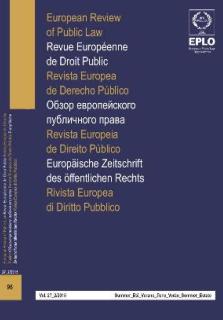
Constitutional Law / Droit constitutionnel
2014
RUSSIA / RUSSIE
ALEXANDR HURSHUDYAN
Junior research fellow of Constitutional and Administrative Law, Law Faculty of St. Petersburg State University
OLGA KUDRYASHOVA
PhD, Associate Professor of Constitutional and Administrative Law,
Law Faculty of St. Petersburg State University
SERGEY OLENNIKOV
PhD, Associate Professor of Criminal Law, Law Faculty of St. Petersburg State University
ILYA VASIL'EV
PhD, Associate Professor of Theory and History of Law, Law Faculty of St. Petersburg State University
CONSTITUTIONAL AMENDMENTS AND REFORMATION OF CONSTITUTIONAL AUTHORITIES
The distinctive feature of the Russian constitutional development in 2014 is the number of significant amendments made in the Russian Constitution. They concerned the territorial composition of the state in connection with the Crimean accession to Russia and the structure of a number of constitutional authorities such as the Council of Federation, the Supreme Court and the Public Prosecution Office. Other constitutional institutions such as local self-government, election system, and constitutional proceedings were also subjected to reformation. Overall, the year 2014 is remarkable for the increase in legislative initiatives and the legislative activity of the federal parliament in comparison with the previous years. In this context, the majority of new laws was adopted in a fast-track procedure and revealed the intention to preserve the existing political regime, to strengthen the presidential power and to suppress the political opposition and the foreign influence in favor of the state interests. This tendency had an adverse effect on fundamental human rights such as freedom of speech, assembly and association, and affected both citizens and aliens.
La principale caractéristique du développement constitutionnel en Russie en 2014 a été le nombre d'amendements importants apportés à la Constitution russe. Ils ont concerné la composition territoriale de l'Etat en liaison avec le rattachement de la Crimée à la Russie et la structure de nombreuses autorités constitutionnelles telles que le Conseil de la Fédération, la Cour suprême et le Bureau du procureur général. D'autres institutions constitutionnelles telles que l'autogouvernement local, le système électoral et les procédures constitutionnelles ont aussi fait l'objet de réformes. Dans l'ensemble, l'année 2014 a été marquée par l'augmentation des initiatives législatives et de l'activité législative du parlement fédéral par rapport aux années précédentes. C'est ainsi que la majorité des nouvelles lois ont été adoptées selon une procédure accélérée et ont révélé l'intention de préserver le régime politique existant, de renforcer le pouvoir présidentiel et de supprimer l'opposition politique et l'influence étrangère au profit des intérêts de l'Etat. Cette tendance a eu des effets négatifs sur les droits humains fondamentaux tels que la liberté de parole, d'assemblée et d'association et a affecté aussi bien les citoyens que les étrangers.





















